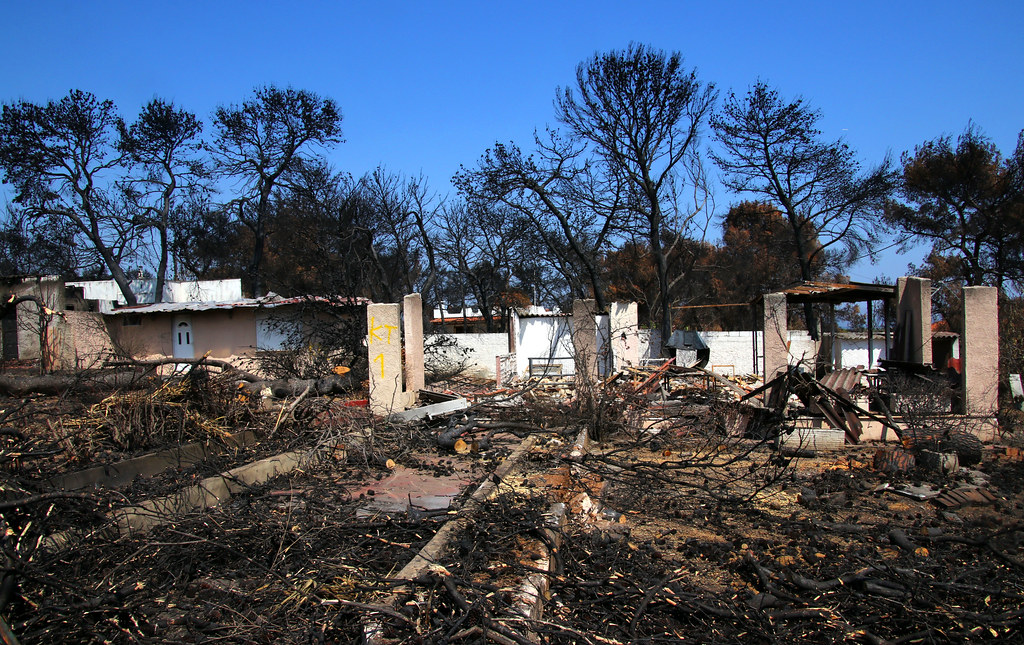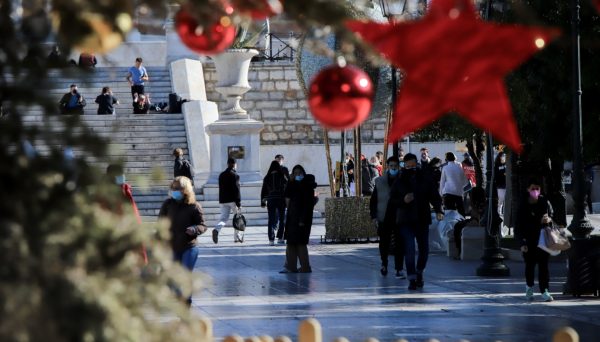
The events of July 2018 during the deadly fire in Mati, which broke out shortly after five in the afternoon when an elderly man started a fire to burn dry grasses in his field on Mt. Penteli that got out of control, are being revived this morning before the 6th Tribunal Criminal Court of Penteli.
The fire in Penteli headed east towards the beach, where it started burning parts of Neos Voutzas, Mati and Kokkino Limanaki just north of the town of Rafina and as far as its northern fringes, while in the following hours “the fire in Mati” had already been ranked as one of the deadliest in the world.
Today, four years later, the Tribunal Court is called to try 21 defendants, then responsible for services and institutions, for the responsibilities attributed to them for the event and what was not done before, during and after the fire that left behind 102 dead, dozens injured and massive destruction.
The former regional governor of Attica Rena Dourou, the then mayors of the region, the former general secretary of Civil Protection and officers of the Service, high-ranking officers of the Fire Department and emergency responders-EMAK, as well as the private person who caused the start of the fire, who is accused, will sit in the docket for arson by negligence.
The defendants will be tried on a case-by-case basis for the offenses of serial negligent homicide by omission by obligees and non-obligees, as well as serial bodily harm by omission.
Victims of the deadly fire, people who lost loved ones, who were seriously injured themselves or members of their families, some of them with serious problems from the burns they suffered, will also appear in court. People who for a number of years have been trying to regain their lives and who expect justice to find if and who are responsible for what happened, for the losses, for their long suffering, for each of the tragedies that make up what is collectively called the “Mati tragedy”.
A multi-month investigation was conducted for the case, at the end of which the Investigator requested the upgrading of the charge to a felony for certain defendants. This position was adopted by the members of the Council of Misdemeanors with a resolution they issued. The matter was decided definitively by the Appeals Council which, adopting a similar prosecutorial proposal, rejected the upgrade to a felony and issued last June a decision that orders 21 of the 23 defendants to be tried for misdemeanors. The appellants acquitted three accused police officers who had been charged, finding that they had given sufficient explanations for their actions.
The defendants are facing an indictment, which, based on the responsibilities they had at the time in question, imputes unpreparedness, wrong assessments of the danger of the situation, failure to intervene immediately using any means to deal with the fire when it started, delayed mobilization both at the level of prevention and at the level of reducing the consequences of the great fire with the timely evacuation of settlements and the declaration of the area in a state of emergency to rescue citizens in need. Heeps of evidence collected during the investigation and which will be studied by the court, show a picture of chaos and confusion that prevailed in the critical hours before the intervention of the services that had the responsibility to coordinate the situation in order to limit the consequences of the fire.
The defendants and the hosting of the trial
The case of the fatal fire in Mati is another multi-person trial the conduct of which requires courtrooms with special specifications that Athens, the largest judicial district of the country, does not have.
The trial with the 21 defendants concerns 102 victims of negligent homicide and 32 victims of negligent physical injury. 213 persons have been called as prosecution witnesses, while dozens of witnesses will be called by the accused to defend them. To these numbers should be added the advocates of the victims and the accused, as well as the journalists who will cover the trial. Space is also required for the case file, which includes tens of thousands of pages of documents and other material that take up a whole room.
For hosting the trial, the proposal of the new Administration of the Court of First Instance was rejected by the Ministry of Justice in order to make available the Ceremonial Hall of the Court of Appeals as the project was deemed “difficult”, due to the Golden Dawn trial being held there. Thus, a room was allocated at the courts of the former Evelpidon military cadet school (building 9 room 12) for the start of the trial, particularly small for the size of the trial. “Provisions will be made to facilitate as much as possible the access of all the actors of the trial to the above room”, said the president of the Tripartite Division of the Court of First Instance Christoforos Linos in a related announcement. Mr. Linos said that the next meetings of the court will be held “in room 3 of building 13 of the Former Evelpidon School, which within the current week will have been properly arranged, with the addition of additional seating for the advocates, seats for the witnesses, as well as microphones”. At the same time, the Court of First Instance will already today have placed the case file in an area adjacent to the hall of building 13, where the trial will be transferred in the coming days.
Once the trial begins, it is expected to last for several months with the statute of limitations (2026) drawing ever closer.
Latest News

DM Dendias: We talk With Turkey But We Always Bring Up Their Unacceptable Positions
Second and last day of closely watched conference, entitled 'Metapolitefsi 1974-2024: 50 Years of Greek Foreign Policy', also included appearances by PM Mitsotakis, Ex-PM Tsipras and PASOK leader Nikos Androulakis, among others

Rhodes Airport Tops Fraport Greece’s Regional Airports in 2024 Performance
According to Fraport's data, more than 35 million passengers (specifically 35.2 million) were handled by Fraport-managed airports during the 11 months.

European Central Bank Cuts Interest Rates by 25 Basis Points
It is the fourth cut of interest rates by Europe’s central bank, a move expected by the markets and financial analysts leading to the rate settling at 3%.

Airbnb: New Measures Add €600 in Extra Costs for Property Owners
Property managers face an immediate administrative fine of 5,000 euros if access to the inspected property is denied or any of the specified requirements are not met.

Economist: Greece Included in the Best Performing Economies in 2024
Meanwhile, Northern European countries disappoint, with sluggish performances from the United Kingdom and Germany.

EasyJet Expands Its Routes from Athens
The airline’s two new routes will be to London Luton and Alicante and they will commence in summer 2025.

Capital Link Forum Highlights Greece’s Economic Resurgence; Honors BoG Gov Stournaras
Capital Link Hellenic Leadership Award recipient, Bank of Greece Gov. Yannis Stournaras, an ex-FinMin, was lauded for his pivotal role during Greece’s economic recovery

Tourist Spending in Greece Up by 14%, Visa Card Analysis Shows
Greece’s capital Athens emerged as the most popular destination, recording a 17% increase in transactions with Visa cards, surpassing even the cosmopolitan island of Mykonos.

Inflation in Greece Unchanged at 2.4% in Nov. 2024
The general consumer price index (CPI) posted a 0.4% decrease in November compared to the previous month

2024 Christmas Holidays: Extended Shop Hours Schedule
The 2024 Christmas Holidays extended shop hours schedule commences on Thursday, December 12 and runs until the end of the year.



![Φυσικό αέριο: Δυναμικό come back του LNG στην Ελλάδα [γραφήματα]](https://www.ot.gr/wp-content/uploads/2023/01/OT_naturalgas-90x90.jpeg)











![Fraport: Πάνω από 35 εκατ. επιβάτες στα αεροδρόμια το 11μηνο – Πτώση στη Μύκονο [πίνακας]](https://www.ot.gr/wp-content/uploads/2022/06/fraport-90x90.jpg)


























 Αριθμός Πιστοποίησης Μ.Η.Τ.232433
Αριθμός Πιστοποίησης Μ.Η.Τ.232433